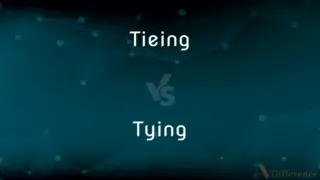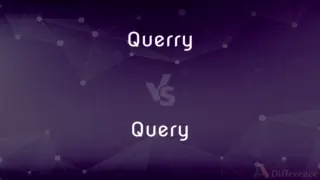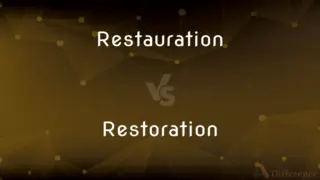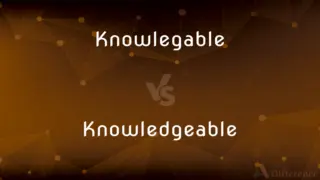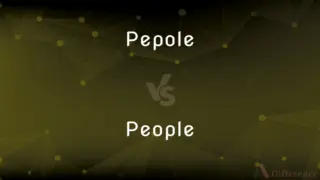Logicality vs. Logic — Which is Correct Spelling?
Edited by Urooj Arif — By Rabia Sajjad — Updated on April 23, 2024
Logicality is the incorrect spelling of logic. Logic refers to reasoning conducted according to strict principles of validity.
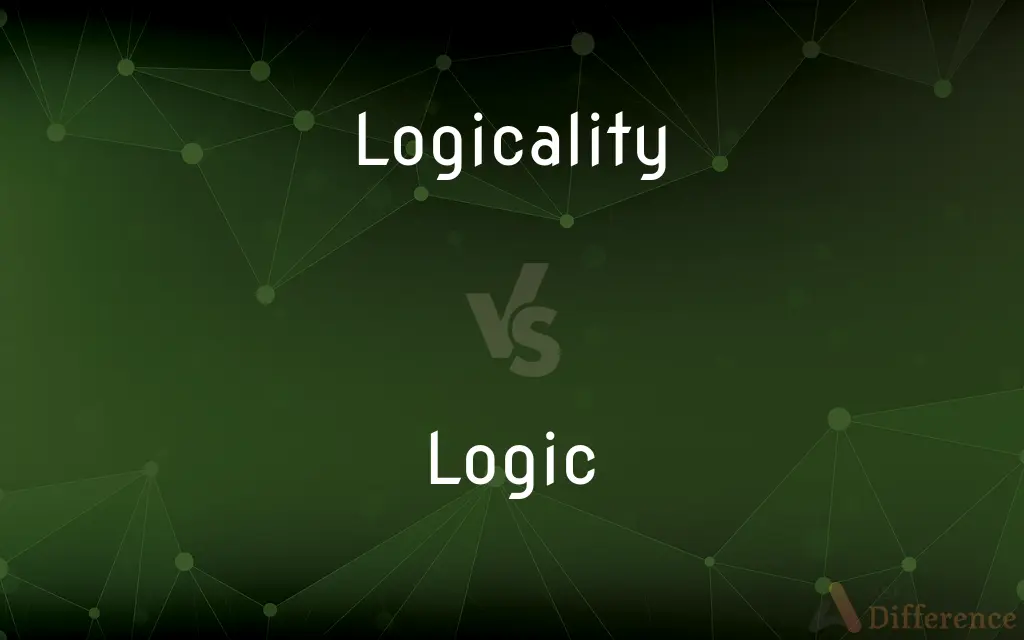
Table of Contents
Which is correct: Logicality or Logic
How to spell Logic?

Logicality
Incorrect Spelling

Logic
Correct Spelling
ADVERTISEMENT
Key Differences
Avoid adding the extra syllables "-icality," which unnecessarily complicates the word.
Note the absence of "al" in the correct spelling which aligns it closer to related words like "logical."
The correct term is often used in philosophy and science, focusing on simplicity and directness: logic.
Remember that the root word "log" relates directly to reasoning, keeping the term concise with "logic."
Logic is a shorter and more common term than logicality, which isn't standard.
ADVERTISEMENT
How Do You Spell Logic Correctly?
Incorrect: His logicality was flawed in many ways.
Correct: His logic was flawed in many ways.
Incorrect: Her explanation lacked logicality.
Correct: Her explanation lacked logic.
Incorrect: He is studying logicality in college.
Correct: He is studying logic in college.
Incorrect: We debated the logicality of the argument.
Correct: We debated the logic of the argument.
Incorrect: The book focuses on the logicality behind the theory.
Correct: The book focuses on the logic behind the theory.
Logic Definitions
The study of principles of reasoning, especially of the structure of propositions and their validity.
Logic is essential for constructing sound arguments.
The systematic use of symbolic and mathematical techniques to determine the forms of valid deductive argument.
Symbolic logic uses symbols to denote propositions and their logical connections.
Rational and reasonable alignment of thoughts and facts.
The detective explained the logic behind concluding the suspect's motive.
Logic (from Greek: λογική, logikḗ, 'possessed of reason, intellectual, dialectical, argumentative') is the systematic study of valid rules of inference, i.e. the relations that lead to the acceptance of one proposition (the conclusion) on the basis of a set of other propositions (premises).
The study of principles of reasoning, especially of the structure of propositions as distinguished from their content, and of method and validity in deductive reasoning.
A system of reasoning
Aristotle's logic.
A mode of reasoning
By that logic, we should sell the company tomorrow.
The formal, guiding principles of a discipline, school, or science.
Valid reasoning
Your paper lacks the logic to prove your thesis.
The relationship between elements and between an element and the whole in a set of objects, individuals, principles, or events
There's a certain logic to the motion of rush-hour traffic.
The nonarithmetic operations performed by a computer, such as sorting, comparing, and matching, that involve yes-no decisions.
Computer circuitry.
Graphic representation of computer circuitry.
Logical
(uncountable) A method of human thought that involves thinking in a linear, step-by-step manner about how a problem can be solved. Logic is the basis of many principles including the scientific method.
The study of the principles and criteria of valid inference and demonstration.
The mathematical study of relationships between rigorously defined concepts and of mathematical proof of statements.
A formal or informal language together with a deductive system or a model-theoretic semantics.
(uncountable) Any system of thought, whether rigorous and productive or not, especially one associated with a particular person.
It's hard to work out his system of logic.
(uncountable) The part of a system (usually electronic) that performs the boolean logic operations, short for logic gates or logic circuit.
Fred is designing the logic for the new controller.
To engage in excessive or inappropriate application of logic.
(transitive) To apply logical reasoning to.
(transitive) To overcome by logical argument.
The science or art of exact reasoning, or of pure and formal thought, or of the laws according to which the processes of pure thinking should be conducted; the science of the formation and application of general notions; the science of generalization, judgment, classification, reasoning, and systematic arrangement; the science of correct reasoning.
Logic is the science of the laws of thought, as thought; that is, of the necessary conditions to which thought, considered in itself, is subject.
A treatise on logic; as, Mill's Logic.
Correct reasoning; as, I can't see any logic in his argument; also, sound judgment; as, the logic of surrender was uncontestable.
The path of reasoning used in any specific argument; as, his logic was irrefutable.
A function of an electrical circuit (called a gate) that mimics certain elementary binary logical operations on electrical signals, such as AND, OR, or NOT; as, a logic circuit; the arithmetic and logic unit.
The branch of philosophy that analyzes inference
Reasoned and reasonable judgment;
It made a certain kind of logic
The principles that guide reasoning within a given field or situation;
Economic logic requires it
By the logic of war
A particular system or codification of the principles of proof and inference.
Aristotle's contributions to logic laid foundational concepts for many disciplines.
The quality of being justifiable by reason.
There's a certain logic in trying to save money before buying something expensive.
Logic Meaning in a Sentence
The logic behind her decision was sound and well thought out.
Teachers explain the importance of logic in science and mathematics.
The course on philosophy introduces students to basic logic.
Understanding basic logic can help improve your problem-solving skills.
It's crucial to apply logic when making difficult decisions.
The logic puzzle took me hours to solve.
He used logic to solve the complex math problem.
She couldn't see the logic in his argument.
They discussed the logic of historical events in class.
You need solid logic to win a debate.
His explanation lacked logic, making it hard to follow.
The developer used programming logic to fix the bug.
Applying logic, she deduced that the secret had to be true.
She admired the logic used in the well-crafted novel.
His quick thinking and logic saved the day during the crisis.
He teaches logic at the university.
Her essay was well-structured and full of clear logic.
Learning about logic is like learning a new language.
Logic is often used in testing theories.
The logic game was both fun and challenging.
His argument broke down due to a lack of logic.
Logic helps bridge the gap between hypothesis and fact.
Understanding the logic of an argument is key to critical thinking.
The science of logic has evolved significantly over centuries.
Using logic, they developed a new strategy.
Logic Idioms & Phrases
According to logic
Following rational reasoning.
According to logic, increasing investment should enhance the project's success.
There's no logic to
Used to express something that doesn't make sense or is unreasonable.
There's no logic to his decision; it's completely irrational.
Logic dictates
Used to express what should naturally happen according to reason.
Logic dictates that turning off your electronics before sleep improves quality of rest.
By logic
Through the process of rational thinking.
By logic, we deduced who was responsible for the error.
Jump to logic
Quickly use reasoning to understand or solve something.
He jumped to logic to solve the issue during the meeting.
Stretch the logic
To apply reasoning in a forced or exaggerated manner.
His conclusion really stretches the logic; it's barely plausible.
Defy all logic
To make no sense despite reasoning.
His survival in the wilderness for a month defied all logic.
Twist logic
To manipulate reasoning to support one's viewpoint.
Politicians often twist logic to suit their agendas.
The logic behind
The reasoning or rationale supporting something.
The logic behind the law is to ensure public safety.
With flawless logic
With perfect reasoning.
She presented her case with flawless logic and won the debate.
Break the logic
To disrupt or challenge conventional reasoning.
Innovative thinkers often break the logic to create new solutions.
Rooted in logic
Based firmly on rational thought.
His strategy is rooted in logic, making it very effective.
Bring logic to
To introduce rational thinking into a situation.
She brought logic to the chaotic meeting and helped find a solution.
Logic falls short
When reasoning or rational argument fails to explain or justify something.
In matters of love, often logic falls short.
Test the logic
To examine the validity of reasoning.
The professor challenged students to test the logic of their theories.
In the light of logic
Considered from a perspective of reasoning.
In the light of logic, his fears seem unfounded.
Against all logic
Contrary to what is logically expected.
Against all logic, he managed to win the game despite the odds.
Lack of logic
Absence of reasonable or coherent reasoning.
There's a glaring lack of logic in his explanation.
Follow the logic
To understand or adhere to a line of reasoning.
If you follow the logic of the argument, the conclusion is undeniable.
Outside the realm of logic
Beyond what can be rationally explained.
Ghost sightings are often considered outside the realm of logic.
Common Curiosities
How many syllables are in logic?
Logic has two syllables.
How do we divide logic into syllables?
Logic is divided into syllables as lo-gic.
What is the verb form of logic?
Logic does not have a direct verb form, but the related verb would be "logically reason" or "rationalize."
What is a stressed syllable in logic?
The stressed syllable in logic is the first syllable, "lo."
Why is it called logic?
Logic is called so because it derives from the Greek word "logos," which means reason or word.
What is another term for logic?
Another term for logic is reasoning.
What is the pronunciation of logic?
Logic is pronounced as /ˈlɑːdʒɪk/.
How is logic used in a sentence?
Logic is often used as a noun referring to rational thought or reason.
What part of speech is logic?
Logic is a noun.
What is the opposite of logic?
The opposite of logic is illogic or irrationality.
Is logic a vowel or consonant?
The word logic starts with a consonant.
Is the word logic a Gerund?
No, logic is not a gerund; it is a noun.
What is the root word of logic?
The root word of logic is the Greek "logos," meaning reason or word.
Is logic an adverb?
No, logic is not an adverb.
Is logic a collective noun?
No, logic is not a collective noun.
Which vowel is used before logic?
Typically, consonants are used before the word logic; however, if a vowel is needed, any vowel can precede it depending on the preceding word.
Is logic an abstract noun?
Yes, logic is an abstract noun.
Is logic a countable noun?
Logic can be both countable and uncountable; it depends on context.
Is the word logic imperative?
No, the word logic is not imperative.
What is the plural form of logic?
The plural form of logic is logics.
Is the logic term a metaphor?
The term logic can be used metaphorically in various contexts.
Which preposition is used with logic?
Prepositions commonly used with logic include "of," "in," and "behind."
Which conjunction is used with logic?
Conjunctions commonly used with logic are "and," "but," and "or."
Which article is used with logic?
The definite article "the" is commonly used with logic.
What is the singular form of logic?
The singular form of logic is logic.
Is logic a noun or adjective?
Logic is a noun.
Is logic a negative or positive word?
Logic is a neutral word; it can have positive or negative connotations depending on context.
Is the word “logic” a Direct object or an Indirect object?
The word "logic" can be used as a direct object in a sentence.
Which determiner is used with logic?
Determiners like "the," "some," or "no" can be used with logic.
Share Your Discovery

Previous Comparison
Boughten vs. Bought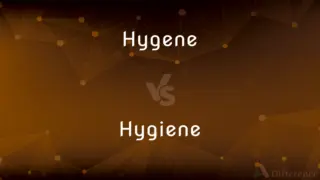
Next Comparison
Hygene vs. HygieneAuthor Spotlight
Written by
Rabia SajjadEdited by
Urooj ArifUrooj is a skilled content writer at Ask Difference, known for her exceptional ability to simplify complex topics into engaging and informative content. With a passion for research and a flair for clear, concise writing, she consistently delivers articles that resonate with our diverse audience.

